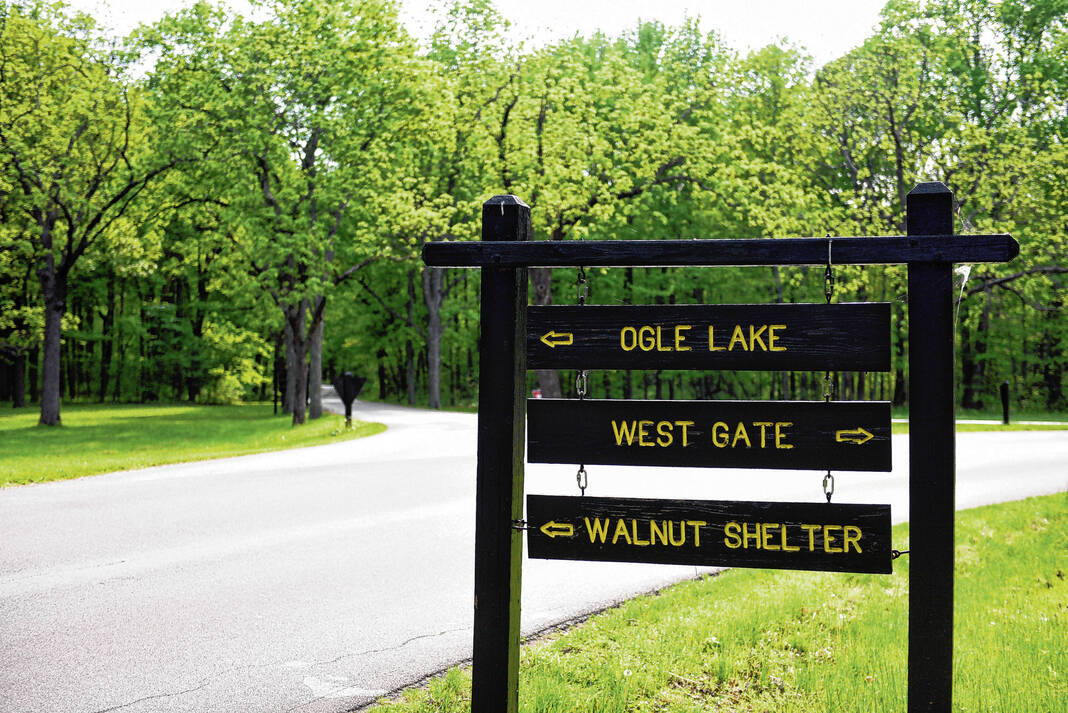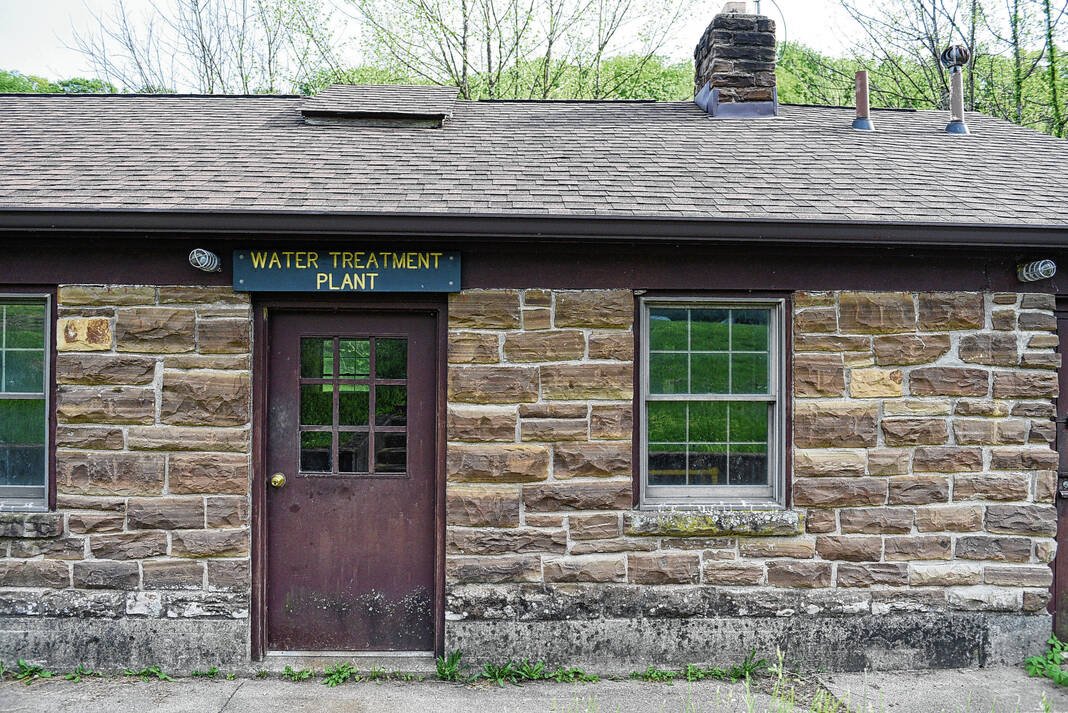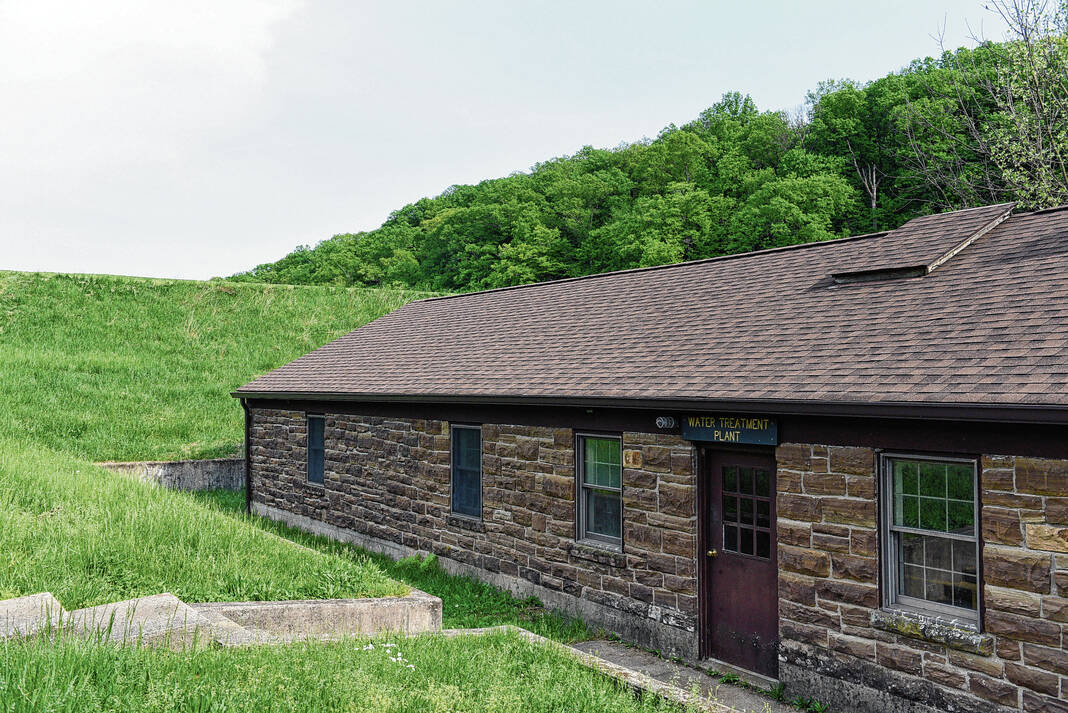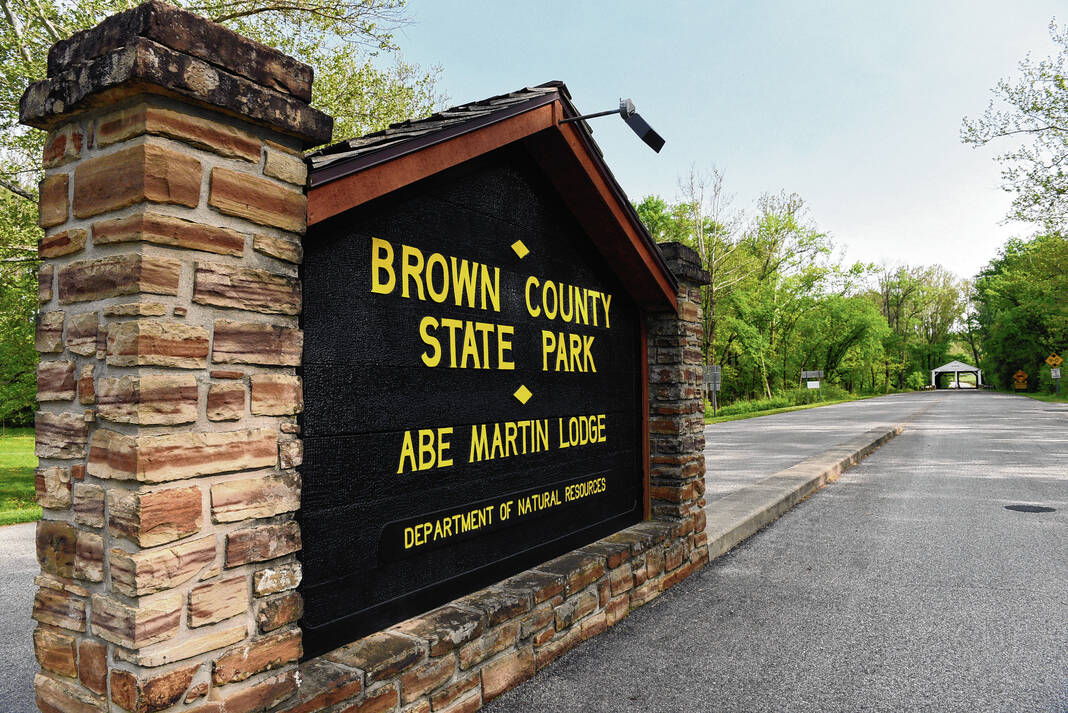
A sign in the state park pointing to Ogle Lake, where water is currently retrieved from and delivered to campsites, restrooms, the Abe Martin Lodge and other places in the park.
Abigail Youmans | The Democrat

The water treatment plant at Ogle Lake in the Brown County State park. The Brown County State Park will soon be the Town of Nashville’s newest customer for water utilities. Construction for the park’s infrastructure is expected to begin in August and be completed by the end of 2023.
Abigail Youmans | The Democrat

The water treatment plant at Ogle Lake in the Brown County State park. The Brown County State Park will soon be the Town of Nashville’s newest customer for water utilities. Construction for the park’s infrastructure is expected to begin in August and be completed by the end of 2023.
Abigail Youmans | The Democrat

The Brown County State Park will soon be the Town of Nashville’s newest customer for water utilities. Construction for the park’s infrastructure is expected to begin in August and be completed by the end of 2023.
Abigail Youmans | The Democrat
Plans to connect the water system in Brown County State Park to the Town of Nashville water utilities are progressing as the Nashville Town Council recently approved a draft bond ordinance and services agreement for the project.
The bond ordinance is a 67-page document stating the money borrowed for the roughly $4,000,000 project is a forgivable loan from Indiana Finance Authority (IFA).
The project has been in the works since last year, but was set into motion earlier this year. Indiana Department of Natural Resources will build their own water infrastructure to provide water to the Abe Martin Lodge, campsites, restrooms and other locations within the park.
The park currently uses Ogle Lake as its sole source for water.
Town Municipal Consultant Dax Norton said in February the town will bring in $10,000 to $15,000 more annually from having the state park as a water customer.
Nashville Town Council President Nancy Crocker said at the April 21 council meeting that the bond attorney spoke with Town Attorney Wanda Jones and reassured that the town is not ultimately “on the hook” for any of the project. The Indiana Department of Natural Resources would ultimately be responsible for paying the loan back if necessary, Crocker said in April.
“Once the project is complete and the (IFA) knows money has been spent properly, the loan is forgiven,” Crocker continued.
The state is using the town as a sort of “surrogate” for funding because the state cannot borrow money from the state, Norton said.
“If a bond is taken out on their side the legislature has to approve it and they’re not in session and won’t be until next January,” he said in April. “IFA will forgive all of this debt.”
The only way the town would be responsible for the loan is if there is “malfeasance or official misconduct,” Norton said.
“Which we won’t do,” he said.
Crocker added that the town’s Utility Services Board is “so thorough” and have done “an amazing job” on the project so far.
“We’re in good shape. A lot of being in good shape is because of the USB,” she said.
Crocker said that the bond ordinance is essentially an “agreement with the state park” that the town is not responsible for paying back any funding for the project.
The state park will be charged a wholesale rate by the town that DNR will pay. That rate was established in February at $4.63 per 1,000 gallons.
Town council and the Nashville Utilities Service Board voted on Feb. 17 to present DNR with a water rate of $7 per 1,000 gallons, but it was ultimately decided on Feb. 23 to instead accept DNR’s proposed rate of $4.63 per 1,000 gallons.
The USB then approved a basic services agreement with DNR, which included the establishment of the $4.63 rate. The current wholesale rate is $3.41 per 1,000 gallons.
“They do not get a retail rate because essentially they become a municipality an and of themselves, similar to us (the town) getting water from Brown County Water,” Norton said.
“If we are to raise our rates, the state park will see that increase.”
The services agreement states that the infrastructure in the park that the town funding through the bonding mechanism will be fully owned by the DNR and the state of Indiana. The state agency will maintain the system.
“We do not have to do maintenance to tank or the lines. Basically we’ll provide water to contractors for 20 years,” Norton said of the services agreement. “That’s the basic nuts and bolts agreement.”
Another step in the project was taken when the USB recently established a water rate for the state park project with town water utilities. That rate was calculated by adding the wholesale cost to town plus roughly 40% of that cost. The rate was accepted by the town council based on the fact that the town will not have to do any maintenance or build the new system. The park will construct and maintain its own water system infrastructure that it will provide to the park.
The services agreement was approved 4-to-1 at the April 21 meeting and the bond ordinance at the May 5 town hall meeting. Hofstetter voted against both the ordinance and agreement.
Last month, town council also approved nearly $3.2 million in bids for two divisions of the town’s part of the project.
The first division includes the construction of the water mains and the booster station at the state park. The second is for the 292,000-gallon water storage tank that also needs to be built.
Curry &Associates will oversee the project through construction.
A $2,685,500 bid was accepted from Striegel Design and Construction for the first division. The lowest bid for the second division was from MidAtlantic Storage Systems at $514,235.
The town council voted 4-to-1 in April to accept the lowest bids. Town council Vice President Anna Hofstetter abstained. She said she did not have enough information about the bids to cast a vote.
The park will use its own pump station, water tower and master meter. This will ultimately not cost the town any additional money, Norton said.
Their rate will also be subject to increases every time the town implements general rate or tracking increases.
Construction is expected to begin in August this year and connect to the town’s water system sometime in 2023, according to Norton.
Dissenting vote
USB member Pam Gould was the only member to vote against the proposed rate at the USB meetings. She also spoke to the town council when the bond ordinance and services agreements were read.
Gould said in February that she did not see the full argument for treating the state park differently than any other paying customer, as all customers have to pay for their own infrastructure on their side of the meter.
With DNR providing their own infrastructure throughout the park, a discount rate was offered and established.
The USB voted on Feb. 17 to present DNR with a discounted water rate of $7 per 1,000 gallons. DNR countered with $4.63 and the USB accepted on Feb. 23.
Gould, a town resident and business owner, pays for water utilities on nine different accounts.
“I don’t believe that the argument that would potentially put the state park in a different category than any other lodging property or restaurant has been properly vetted,” she said.
She said the argument that they are paying for their own infrastructure “doesn’t carry weight” when talking about a wholesale rate being charged to the park.
“I pay for anything on my side of the property line and the town pays for anything up to that point. In this case the state park is paying for their portion, we pay for ours. There’s nothing different about the state park situation than any other user or customer in this water system.”
The state park should not be considered as another utility or municipality because customers are not charged for using water, she said.
“To my knowledge the state park doesn’t charge the customers — or even a line item on their bills — for water. I think this has been very mishandled,” she said.
Gould said the USB are “highly motivated to solve the problems with the leaks,” but there is no assurance that they are going to be fixed before the water gets turned on to the state park when the project is completed.
“As a rate payer and a citizen, I’m very aggrieved over this first ever discount being offered to any customer of any kind,” she said. “Not only was it a discount, but steep discount. The current residents and rate payers will not only have to pay for an aging water system but subsidize water usage of a competitor.”
Current town residents and businesses who are customers of town water utilities pay $12.97 per 1,000 for the first 10,000 gallons.
Town resident Heather Nicholson said she also had concerns about the state park project at the April 21 town council meeting. She asked that since water rates are going up for town customers if the state park is paying the same rate as citizens.
The town council approved a 10.8 percent rate increase in March which will go into effect to water utility customers in June, raising the rate to $14.37 per 1,000 gallons.
That increase is to cover the current operating costs of the water treatment plant.
Norton told her the state park has a wholesale rate because they are paying roughly $3.75 million for their own infrastructure and the town is not.
Nicholson was also concerned about water loss in the town, which has undetermined causes at this time.
At the USB meeting on May 11, utilities Superintendent Robin Willey said the department had recently found two significant leaks. One leak is about 200,000 gallons per month on Hawthorne Drive. Another leak causing a loss of 400,000 gallons per month was found on State Road 135 North. Willey said now that the weather is warmer and ground is soft they’ll be able to tell where leaks truly are.
Norton said there is a process underway to isolate the line that sends water to the state park so it will be clear if any of the water loss is in that line before the park is connected.
“We’ll remedy that long before (the park) comes on the line,” Norton said.
“You’ll continue to lose that even when they come on line. By the time they come on we will have found out if the lines that send water to the state park will be losing any water and that problem will be remedied.”

